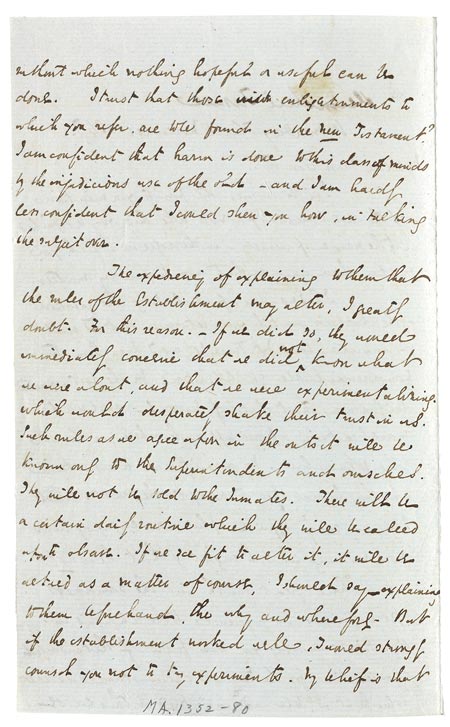
Dickens's letters to Burdett-Coutts are, by any standard, extremely long and detailed and reveal his extraordinarily competent administrative abilities as well as shrewd insight into the minds and motivations of the women who would enter Urania Cottage. He insisted "that their past lives should never be referred to." He also recognized "that these unfortunate creatures are to be tempted to virtue. They cannot be dragged, driven, or frightened." Dickens's meticulous attention to detail is apparent in this letter, in which he informs Burdett-Coutts that "I have laid in all the dresses and linen of every sort for the whole house... I have made them as cheerful in appearance as they reasonably could be—at the same time very neat and modest."
Philanthropy
From 1840 Dickens guided the charitable work of philanthropist Angela Burdett-Coutts (1814–1906), the wealthiest heiress in Victorian Britain. Dickens served as her official almoner and helped to assess the merits of the thousands of letters she received from those seeking financial assistance. He also advised on her plan for improved sanitation in the slums of Westminster and drew her attention and support to the Ragged School Union, which provided education to London's poorest children. A pragmatist, Dickens encouraged Burdett-Coutts to direct her philanthropy toward the causes of distress. In 1847 they founded a home, Urania Cottage, in Shepherd's Bush, as a shelter for homeless women—prostitutes or petty criminals who sought to rehabilitate themselves by learning practical skills and developing self-discipline. Many of the women were assisted to eventually emigrate to one of Britain's colonies to begin a new life. For more than ten years, Dickens administered Urania Cottage on behalf of Burdett-Coutts and played an extremely active role in its day-to-day management.
without which nothing hopeful or useful can be done. I trust that those enlightenments to which you refer, are to be found in the New Testament? I am confident that harm is done to this class of minds by the injudicious use of the old—and I am hardly less confident that I could shew you how, in talking the subject over.
The expediency of explaining to them that the rules of the Establishment may alter, I greatly doubt. For this reason.—If we did so, they would immediately conceive that we did not know what we were about, and that we were experimentalizing. Which would desperately shake their trust in us. Such rules as we agree upon in the outset will be known only to the Superintendents and ourselves. They will not be told to the Inmates. There will be a certain daily routine which they will be called upon to observe. If we see fit to alter it, it will be altered as a matter of course, I should say—explaining to them beforehand, the why and wherefore. But, if the establishment worked well, I would strongly counsel you not to try experiments. My belief is, that
